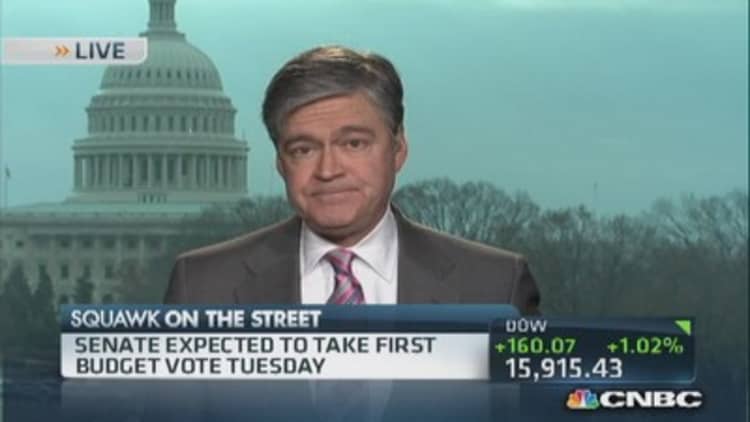The Federal Reserve will take center stage in Washington this week. When it does, the central bank's Federal Open Market Committee might be tempted to count out Beltway dysfunction as a threat to the economy and therefore a reason to delay a decision to start cutting back on its $85 billion per month in economy-boosting asset purchases.
After all, the Senate seems likely to approve a budget deal that would set spending levels for the next two years and probably eliminate the threat of a government shutdown.
But the Fed—and the rest of America—should probably think again.
The budget deal would certainly be a welcome step away from governing by crisis and could herald a 2014 where the sequester spending cuts are less of a drag on growth. But the deal, should it squeak through the Senate, does not mean Republicans and Democrats in Washington will start toasting marshmallows together and singing "Kumbaya."
(Read more: How the Senate could kill the budget deal)
Indeed, House Budget Committee Chairman Paul Ryan, R-Wis., one of the authors of the latest fiscal deal, made it clear over the weekend that the GOP would once again look to turn the vote over raising the nation's debt limit next year into a weapon to extract policy concessions from Democrats.
"We as a caucus—along with our Senate counterparts— are going to meet and discuss what it is we're going to want out of the debt limit," Ryan said on "Fox News Sunday." "We don't want 'nothing' out of this debt limit. We're going to decide what it is we're going to accomplish out of this debt limit fight."
Ryan signaled two important things with these comments: The GOP will want something for lifting the debt limit, and it has no idea what that something is.
There will likely be pressure from the right to again use the debt limit to take some kind of bite out of Obamacare. Republicans plan to make the 2014 midterm elections a referendum on the president's health care law, believing it will remain relatively unpopular and plagued by implementation problems.
But it's not clear exactly what they would ask for given the debt limit fight will come at the end of March at the earliest, per Treasury Department estimates, and may be delayed as late as June, according to the Congressional Budget Office assessment of when the federal government will run out of money to pay the bills.
By then, Americans will be deeply into the Affordable Care Act enrollment process, so seeking full repeal may seem like an absurd political demand, unless implementation gets even more problematic. Right now the trend seems to be that the enrollment process is getting somewhat better, not worse. So the GOP may have to come up with something of short of a full-repeal demand on health care.
(Read more: Opinion on Obamacare drops slightly)
But whatever they try to add will almost certainly be rejected by the White House and congressional Democrats, setting the stage for a possibly ugly debt limit fight.
Or Republicans could decide to again call for dollar-for-dollar spending cuts to match any debt limit increase, another demand certain to be labeled "hostage-taking" and rejected by Democrats.

The only real hope for returning the debt limit hike to its historic norm as a mostly pro-forma vote is for Republicans to make more modest fiscal requests, the kind that have often accompanied votes to lift the borrowing limit.
Even if Congress manages to raise the debt limit with relatively limited drama next year the idea that the Ryan/Murray deal heralds a new era of bipartisan deal-making is almost certainly oversold.
Both Ryan and Sen. Patty Murray, D- Wash., over the weekend suggested that corporate tax reform could be a possibility next year with an agreement to lower the top rate while raising revenue through loophole closing.
But there is still the very stubborn issue of what to do with whatever revenue gets raised.
Democrats will want to apply some new revenue to infrastructure or education spending while the GOP will almost certainly demand that the money be applied to deficit reduction.
(Read more: )
Could some balance be found? Certainly. Will it be excruciatingly hard? No question. And that does not even touch the question of which loopholes to close or whether to allow companies to bring back foreign-held funds at a lower rate.
All of this will be fought against the backdrop of the 2014 campaign, which will make compromise on any issue—including long-hoped for immigration reform—very difficult.
So as the Fed makes its decision on whether to taper it should consider this: The acceleration in economic growth appears to be real, but the new era of good feelings in Washington may be a mirage.
—By Ben White. White is POLITICO's chief economic correspondent and a CNBC contributor. He also authors the daily tip sheet POLITICO Morning Money [politico.com/morningmoney]. Follow him onTwitter @morningmoneyben.


